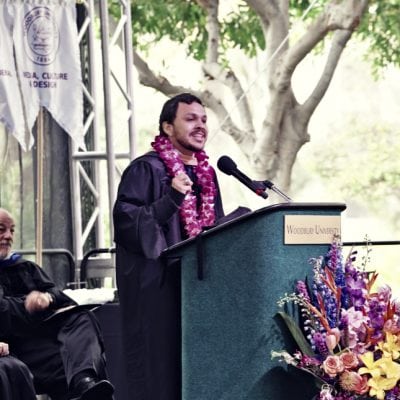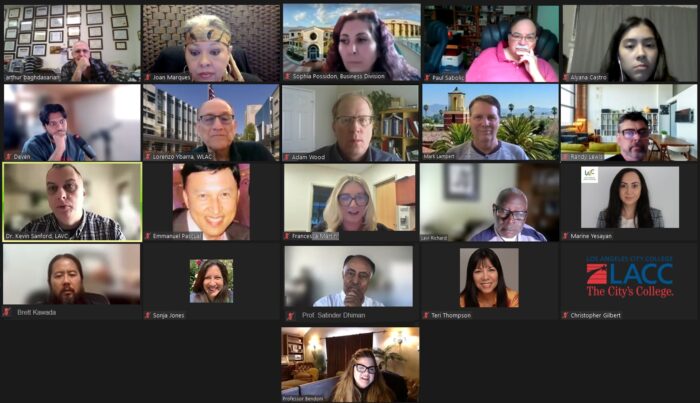School of Business
Master of Business Administration (MBA)
Cultivating Innovative Leaders for a Sustainable Society
Woodbury University’s MBA focuses on three tenets: Responsible Leadership, Sustainable Business, and Self-Empowerment.
- Becoming Responsible Leaders through social responsibility and ethics initiatives
- Developing Sustainable Businesses by rethinking the way we do business to optimize resources
- Harnessing Self-Empowerment to take control of decision-making and to make positive choices
With our Merit Scholarships, we provide an affordable private-school MBA with a work-compatible and practice-based curriculum. All students with business or non-business undergraduate degrees are invited to apply. Students with an undergraduate business degree can complete the MBA in one year as a full-time student. No GMAT/GRE required.
Apply Request Information Take a TourMerit Scholarships
MBA applicants qualify for a merit scholarship up to $20,000. The GPA for admission purposes will be calculated over the most recent 30 graded semester (45 quarter) credits completed in either a baccalaureate or post-baccalaureate program, including credits earned toward a credential. All credits earned in the semester in which the 30th semester (45th quarter) credit occurs will be included in the GPA calculation. The GPA breakdown for a scholarship award is as follows:
-
GPA of 3.7 to 4.0 earns $20,000
-
GPA of 3.40 to 3.69 earns $18,000
-
GPA of 2.95 to 3.39 earns $12,000
-
GPA of 2.50 to 2.94 earns $8,000
MBA Curriculum
Through our applied practice-based MBA curriculum – which you can earn in as few as 12 months from our 7-week evening course format – students will create positive change.
All students complete the MBA Capstone: Strategic Management and Consulting, where students work collaboratively in teams helping local businesses develop their marketing plans and strategy.
While a General MBA is available, you can also tailor your MBA experience to fit your interests with one of five concentrations:
-
Accounting-Finance
-
Global Strategy-Leadership
-
Entertainment
-
Entrepreneurship
-
Sustainability
Our Learning Environment
Students learn from top-caliber, personable faculty who know your first name and engage in close collaboration with supportive peers. Our community-based learning environments provide interactive, workshop style classrooms that will inspire you to become the next future business leader.
Designed to provide students with an unmatched foundation in leadership and to think beyond the status quo to an array of in-demand career and entrepreneurial opportunities. Our MBA offers the following benefits:
Collaborate with peers, faculty, and special guest speakers in our immersive learning environment on our 22-acre picturesque Burbank campus, enabling you to network with classmates and professors.
MBA Program Features
Woodbury’s intensive degree format allows students to complete their MBA degree while balancing the demands of their personal and professional life. The 36-credit program contains 12 integrated courses that can be completed in as little as one year.
Courses are offered in 7-week sessions with two sessions per semester, allowing students to take as many as four courses per semester.
- Classes meet from 6:00pm – 10:00pm one weeknight evening each week
Select courses may be offered in hybrid format, with some online sessions and some physical meetings, to reduce commuting stress while enhancing the learning experience.
For those without an undergraduate degree, Woodbury offers the MBA program in conjunction with a BBA in Management, which can be completed in four years.
Learn more about the BBA-MBA Accelerated Program
Courses
Woodbury’s Master of Business Administration curriculum is comprised of a sound foundation of functional skills in the areas of accounting, finance, economics, marketing and IT. This knowledge base is further enhanced by a profound understanding of organizational behavior skills, including emotional intelligence, ethical leadership and strategy.
In addition, the MBA capstone provides an excellent consulting opportunity in which students collaborate on developing a client engagement, performing consulting services for that client and presenting the results to both the client and their peers. This will help you hone on your consulting skills through the actual completion of a real-life consulting project.
Pre-MBA courses are intended to ensure that all graduate students have a similar academic background. They need to be completed by students who do not have sufficient business courses or the equivalent. These courses are in addition to the 36 units listed above (a total of up to 45 units)
PRE-MBA COURSES UNITS
PMBA 501 Accounting Practices 3
PMBA 506 Organizational Behavior and Strategy 3
PMBA 508 Fundamentals of Finance, Economics and Statistics 3
ACCT 600 Financial Accounting
An accelerated course in financial accounting with emphasis on the fundamentals of accounting and the preparation, analysis, and interpretation of financial statements. Students will develop the skills needed in understanding and analyzing of corporate financial statements for decision-making by prospective consumers of accounting information, such as managers, stockholders, creditors, financial analysts, and regulators. Students will also develop the skills needed to interpret how accounting standards and managerial incentives affect the financial reporting process. Prerequisites: PMBA 501 or Graduate Standing.
MGMT 603 Quantitative Methods for Business Decisions
This course is an introduction to quantitative methods used in solving problems in accounting, economics, finance, management and marketing. Includes the fundamentals of business mathematics, operations research modeling and statistical analysis. Lecture. Prerequisites: PMBA 502 and PMBA 505 or their equivalents, and graduate standing.
MGMT 604 Managerial Economics
This course focuses on basic economic theory with applications to business and policy issues. Special attention to the major concepts and methods of analysis applied to aggregate micro- and macroeconomic activity is given. Lecture. Prerequisite: PMBA 502 or its equivalent and graduate standing.
MGMT 605 Managing and Leading Organizations Ethically
This course deals with an in-depth examination of behavioral issues in organizations. Course topics include individual and group behavior, communication issues, ethical theories, employee empowerment and motivation, and managing and leading organizations under conditions of uncertainty. The course requires students to apply advanced knowledge of management and leadership skills in the pursuit of creating effective organizations through teamwork. The central objective of this course is to learn how to create socially sensitive, high performing organizations: organizations that are financially viable and ethically responsible. Working as a team member, every student will complete one social action project in this course. Lecture. Prequisite: PMBA 506 or its equivalent and graduate standing.
MRKT 606 Marketing Concepts and Strategies
This course will equip students with the relevant knowledge, perspectives, and practical skills required to develop marketing strategies that leverage the opportunities inherent in today’s global, digital marketplace including: international marketing, social media, consumer-to-consumer online interactions, internet marketing, mobile marketing, and big data. The elements of the marketing mix and the promotional mix are reviewed with an emphasis on the development of sound strategic planning, implementation and control. Case studies will be used to simulate management decision-making processes in the marketing arena. Lecture. Prerequisite: PMBA 504 or its equivalent and graduate standing.
FINA 607 Managerial Finance, Theory and Practice
This course explores the principles of finance and their application to typical financial problems of business enterprises. Emphasis is placed on the methods used by business managers to make investment, dividend and financing decisions. Lecture. Prerequisite: PMBA 501 and PMBA 502 or their equivalents and graduate standing
MGMT 609 – Management of Information Technology
The role of information as a corporate resource, and its use in providing strategic advantage. Problems of aligning corporate IT and corporate goals, creating IT architectures and using IT to enable change in organization. The case study method is used. This course is appropriate for both users of systems and providers of system support. Prerequisite: Graduate standing.
MGMT 608 Entrepreneurship
This is a course requiring the integration of management functions for a new business venture. Students must devise a feasibility study and an organizational structure. Consideration is given to legal and tax issues; marketing strategy; financing needs and sources; cash flow forecasts; and pro forma financial statements. A team approach will be utilized, with members preparing and presenting written and oral reports. Lecture. Prerequisite: Satisfaction of CPC requirements and graduate standing.
MGMT 682 Strategic Management Consulting
This course is a capstone seminar in strategic management incorporating organization/consulting and design thinking elements. It examines the roles and responsibilities of top managers in developing, implementing, and managing an effective organization-wide strategy. Students learn current, new and future perspectives and concepts as well as integrate learning from previous course work to solve complex and challenging business problems. Specifically, this course provides the students with an overview of the “world” of strategic consulting and consulting as a career. Students will develop the basic conceptual and skill-based understanding required to practice consulting or hire and work with an outside consultant. A case study method is used to develop an integrative enterprise perspective. Being the capstone course, it must be taken within 6 units of graduation and after the completion of all PMBA course requirements.
ACCT 601: Managerial Accounting
This course studies managers’ effective use of accounting information in decision-making. Includes cost-volume-profit relationships; the use of standard cost and flexible budget systems; cost reports; managerial control and performance evaluation. Lecture. Prerequisite: PMBA 501, or its equivalent, and graduate standing.
FINA 611 International Finance
The international financing and investment decisions of multinational business organizations and the international financial environment. Theories and techniques of international investment and financing are viewed within the context of different currencies; shifting exchange rates, different tax, legal and political environments. Lecture. Prerequisite: FI 507 or WMBA 507, or its equivalent, and Graduate standing.
FINA 612 Corporate Finance
An intensive course in corporate finance. Emphasis on the development of objectives and standards that lead to the effective allocation and use of a business entity’s resources. Topics covered include financial statement analysis, cash budgeting, working capital management, capital budgeting, capital structure and asset valuation. Examination of the interaction of investment and financing decisions and dividend policy. Lecture. Prerequisite: FI 507 or WMBA 507, or its equivalent, and Graduate standing.
FINA 614 Investment Analysis
The analytical methods and theory underlying the appraisal of stocks, bonds and other investment assets. Special attention to techniques of securities analysis and valuation based on financial statements, earnings projections and the value of capital of the firm. General theories of portfolio composition and performance. Lecture. Prerequisite: FI 507 or WMBA 507, or its equivalent, and Graduate standing.
FINA 615 Money and Capital Markets
An analysis of the markets for financial assets, including the money market and various bond and stock markets. Topics include the level and structure of interest rates, the regulatory structure of financial markets, and the role of the Federal Reserve Board and financial institutions in determining and implementing monetary policy. Lecture. Prerequisite: FI 507 or WMBA 507, or its equivalent, and Graduate standing.
ACCT 631: Governmental and NonProfit Accounting
This course is designed to provide an understanding of the accounting concepts and procedures used in the operation of nonprofit entities (governments, hospitals, universities and others). Lecture. Prerequisite: PMBA 501, or its equivalent, and graduate standing.
ACCT 648: Tax Theory and Application
This course provides an analysis of the laws of taxation at the federal level, relative to corporations and their shareholders, capital assets, natural resources, real estate, and other topics of timely interest. Lecture. Prerequisite: PMBA 501, or its equivalent, and graduate standing.
ACCT 650: Controllership Accounting
This course provides a comprehensive study of the development and application of accounting data for the purpose of planning and controlling business activities. Topics include various product costing systems, cost allocation methods, standard cost variances, operating budgets, capital investment budgets, pricing, internal audit and control. Lecture. Prerequisite: WMBA 501 or its equivalent, and graduate standing.
MGMT 610: Management of Global Enterprise
This course provides an exploration of the international business management issues providing a broad, multi- disciplinary awareness of global business management trends and practices, especially the impact of culture on business. Topics include global economic institutions, cross-cultural management, international managerial negotiations, and business management practices in the emerging global markets. Prerequisite: PMBA 504 or its equivalent and graduate standing.
MGMT 618: International Marketing
This course examines the development of international marketing programs from determining objectives and evaluating international market opportunities to coordinating strategies in the world market. Lecture. Prerequisite: WMBA 506 or its equivalent and graduate standing.
MGMT 641: Comparative International Management
This course provides a comparative study of management practices in selected foreign countries. Students will analyze social and cultural variables that affect the management process and solutions to managerial issues of policy and action. Lecture. Prerequisite: WMBA 505 or its equivalent and graduate standing.
MGMT 642: International Business Strategy
This course takes a managerial approach to selected international operations issues. Topics includes global strategies; long-range planning, preparation and evaluation of direct investment proposals; entry and ownership strategies; supply strategies; and organization and human resource management. Lecture. Prerequisites: WMBA 506 or its equivalent and graduate standing.
MGMT 654: Self-Leadership for Executives
Students will explore concepts of self, being, becoming, authenticity, virtue, values, happiness, resilience, self-discipline, self-authorship, and self-transformation in the context of leadership. Through self-exploration, self-reflection, and practical reflexivity, students will deepen their self-understanding and then create their ideal of who they wish to become as leaders. Central to your learning experience in this course will be attaining a clear understanding of the self-mastery process, with its building blocks of self-intention, awareness, authenticity, and accountability. The final project will focus on creating a personal developmental plan and a self-leadership model to facilitate in the process of becoming authentic and effective leaders.
MGMT 657: Spirituality in the Workplace
This course focuses on the implications of spirituality in the workplace. It draws upon the common themes underlying various spiritual traditions to search for meaning in the workplace. The holistic approach to work will be extended to arrive at a new vision of livelihood for our times, evidenced by managing for common good and corporate stewardship. The practical aspects of the course will include writing a personal mission statement, designing an organization based on spiritual values such as integrity, authenticity, compassion, trust, and service.
MGMT 660: Ethical Leadership
This multi-disciplinary leadership survey course explores the ethical dimension of leadership by tapping into the collective wisdom found in disparate fields such as literature, philosophy, history, biography, politics, arts, sports, and business and applies it to the leadership challenges and dilemmas faced by modern organizations. The basic premise of this course stems from our belief that fundamental challenges of leadership are of universal nature and that the insights culled from disciplines such as literature, humanities, arts and history can provide us with a matchless treasure trove for understanding the elusive art and practice of leadership. Prerequisite: WMBA 505 and graduate standing.
MGMT 665: Emotional Intelligence at Work
This is a survey course that introduces students to the key emotional intelligence issues related to organizational performance, such as role of emotions in decision making and thinking strategically about information contained in emotions. We will examine and evaluate existing scientific views on EI and its measuring options. Learning objectives include assimilating emotional intelligence theory components; self-assessing to recognize areas for professional and organizational growth; reporting on the use and validity of emotional intelligence as a means for enhancing professional and organizational success; and gaining skills to apply emotional intelligence strategies to daily workplace situations, relationships, and challenges. These skills can be applied in leadership positions pursued by graduate students. While the emotional intelligence development focus of this course is the use of skills in a student’s place of employment, students are encouraged to apply these skills in addressing all aspects of their lives – at home, in the community, and in the classroom. As a result of this course, students will have enhanced skill set through which they can perform professional duties at work and in life. Prerequisites: WMBA 505, Management and Organizational Behavior.
MGMT 666: Change Management
Contemporary organizations exist in social, political, and economic environments that change rapidly and unpredictably. This course deals with how to manage changes by looking at strategy, organization design and processes, and multi-organizational systems. Theories and practice of change management related to the individual, group, inter-group, and organizational level are discussed. Methods of diagnosing organizations and designing interventions that will increase an organization’s effectiveness are explored. The course examines the complexity in developing a culture of change within the organization as well as in determining the organizations’ readiness for change. Through a series of experiential lessons, case studies, and activities students will uncover the reasons for resistance to change and tactics for coping with this resistance and for strategically managing organizational change. Prerequisite: WMBA 505, Management and Organizational Behavior.
MGMT 670: Topics in Management
Topics focus on current issues in management. Lecture. Prerequisite: PMBA 505, or its equivalent, and graduate standing.
MGMT 634: Ethics of Sustainability
This course focuses on the ethico-spiritual basis of sustainability in a wide variety of contemporary contexts—from economics of consumption and growth to government policy and sustainable planet. It garners “big-picture awareness” and a “cosmic vision” of sustainability, a vision that extends from our neighborhoods to our communities, to states, countries, globe, galaxy, and envelops the entire Universe! Using a case studies approach, it will address the practical/engaged dimension of sustainability: What can we all do to save the planet?
MGMT 620: Fundamentals for Social Entrepreneurship
This course introduces students to social entrepreneurs and their organizations within a global context. What are the common characteristics of social entrepreneurs and their organizations regardless of their location and operating industry? How do the local circumstances influence the problems they address, the organizational and business models they decide to pursue, and their growth options? When and how do they engage in partnerships with one another and with business or public sectors, and how do these partnerships perform? The course will draw upon instructor and guest lectures, case studies, individual- and teamwork. Students will identify in teams a local and an international social entrepreneurial venture, which they will explore in depth, and present to their peers.
ACCT 666 Cast and Crew: Financial Accounting Practices
This course studies accounting for broadcasting, cable television, films, and the music industry. It studies the accounting and tax issues pertaining to the entire production cycle, from script development to pre-production, production, post-production, marketing, distribution, and release. Topics include revenue and expense recognition, production capitalization, distribution accounting, waterfall payments to talent, studios, and producers, film costs, music licensing, general licensing, and disclosure. Lecture Pre-requisites: None. 3 Units.
MGMT 659: Entertainment Law and Ethics
This course addresses legal and ethical issues to preserve, protect, and actualize the intellectual and technological property of people working in the entertainment industry. It provides an overview of entertainment law and key legal principles and contractual relationships related to artistic creation and the managing of arts organizations. Topics include contracts, celebrity status (including privacy and publicity rights), compensation, idea protection, live performances, copyright, defamation, privacy, and the right of publicity, intellectual property, First Amendment, cultural property, human resources management, and talent representation. Lecture Pre-requisites: None. 3 Units.
MGMT 663: Management and Leadership Administration Master of Business in the Entertainment Industry
This survey course focuses on some of the current management and leadership theories as applicable to the arts and entertainment industry. It prepares students to organize and motivate people within the entertainment industry, manage social environments, and implement change. Topics explored include applied organizational design and culture, project management, managing change and conflict resolution, designing effective reward practices, and team building in the arts and entertainment industry. The course follows a case-study approach. Pre-requisites: MGMT 605, Managing and Leading Organizations Ethically. 3 Units.
MGMT 664: Creativity in Arts and Entertainment Enterprises
This course will explore what it takes to be “creative” and “innovative” within the arts and entertainment industries. Students will explore the notion of creativity and how it applies to the production of goods and services within various sectors of the creative industry, including film, music, television, radio, and video games. Students work with various key tools and methods to promote creativity in oneself and others, contribute to a creative team project, manage development frameworks to foster creativity and establish a culture of creativity and innovation within an arts and entertainment organization. Lecture Pre-requisites: None. 3 Units.
MGMT 667: Entertainment Marketing, Promotion, and Branding
In this course, students will learn how the marketing of a movie in a competitive marketplace determines its domestic and international financial success. Students will learn how and why certain movies receive top marketing support while others receive a minimal marketing budget. Topics include independent versus studio films, franchise-driven strategies, domestic and international strategies marketing and distribution, positioning entertainment brands, traditional and digital media, consumer research, brand development and licensing, and revenue streams. Lecture Pre-requisites: None. 3 Units.
MGMT 668: Human Resource Management in Arts and Entertainment
This case-study-based course examines HR procedures and practices pertaining to arts and entertainment industry, including recruitment, flow, scheduling, payroll and salary, and anti-discrimination laws. This course also explores HR model for entertainment industry. It studies some of the best industry HR practices of attracting, developing, rewarding, and retaining employees in competitive environment of entertainment business. It is primarily based on case studies of effective HR practices of various entertainment firms and companies. Lecture Pre-requisites: None. 3 Units.
MRKT 660: Marketing and Media in Arts and Entertainment Enterprises
This course explores the concepts of marketing and media in the entertainment industry. Topics include copyrights, intellectual property rights, and royalties, entertainment promotion and branding, audience development for arts, gallery management, exhibition design, social media in arts and entertainment, artist representation and management, trends in visual arts, and other related current topics. Lecture Pre-requisites: MRKT 606, Marketing Concepts and Strategies. 3 Units.
MGMT 611: Small Business Management Administration Master of Business
This course covers the essential business management competencies to start and operate a small business. Topics include fundamentals about small business, essential management and leadership skills, startup opportunity analysis/assessment, preparing a business plan, marketing strategies, financial management, human resource management, franchising, governmental regulation, taxation, and various other legal issues pertaining to small businesses. Lecture Pre-requisites: MGMT 608, Entrepreneurship. 3 Units.
MGMT 612: Business Law and Regulatory Issues for Entrepreneurs
This course studies legal and regulatory issues relating to small business entrepreneurs. Key topics include business forms (sole proprietorship, partnership, and incorporation), contract law and sales contract; tort law and negligence; franchises; taxation and employer’s responsibility; property and ownership issues; intellectual property rights; patent, trademarks and copyright law; venture capital; employment law and insurance; bankruptcy. Lecture Pre-requisites: MGMT 608, Entrepreneurship. 3 Units.
MGMT 614: New Venture Creation
Building on the process model of entrepreneurial venture-creation, this course focuses on the prestartup, startup, and early growth of new business ventures. The new ventures creation phase involves identifying opportunities, matching business ideas and opportunities with aspiring entrepreneurs, and identifying funding venues. Subject matter of the course is organized around the following themes: seeking and evaluating opportunities for new ventures; leveraging resources to convert those opportunities into concrete business propositions; and developing appropriate entry and exit strategies. Taking an applied approach, each student will work with a local entrepreneur or small business and develop a detailed startup financial plan for a new venture that has the potential to secure a prospective investor. Lecture Pre-requisites: MGMT 608, Entrepreneurship. 3 Units.
MGMT 616: Family Business Management and Succession Units
This course focuses on the challenges and opportunities of managing the interests of two distinct, yet connected institutions: the business and the family. Perhaps the oldest form of business organizations, a family-owned business denotes any business in which two or more family members are involved and the majority of ownership or control lies within a family. Key topics include understanding the uniqueness of family business in terms of culture, stages of evolution, career planning, business ownership, family structure, hiring relatives, sibling rivalry, insurance, and legal issues, and organizational issues, such as succession and estate planning. Real-world family cases are examined in-depth and local family business owners serve as invited speakers. Lecture Pre-requisites: MGMT 608, Entrepreneurship. 3 Units.
MGMT 618: Innovation and Creativity for Entrepreneurship
The course will give students an opportunity to develop an understanding and critical awareness of current theories and approaches relevant to managing creativity, innovation, and change in the workplace on a personal, organizational, and national level in a world characterized by the globalized economy. Knowledge of various techniques, strategies, and skills appropriate for creative and innovative thinking will be drawn upon through a series of lectures, workshops, and small-group learning. Lecture Pre-requisites: None. 3 Units.
MGMT 620: Fundamentals for Social Entrepreneurship
This course introduces students to social entrepreneurs and their organizations within a global context. The course will draw upon instructor and guest lectures, 2021-2022 Course Catalog 121 case studies, individual and team work. Students will Administration Master of Business identify in teams a local and an international social entrepreneurial venture, which they will explore in depth, and present to their peers. Individually, they will embark on a preliminary mission toward the creation of a social entrepreneurial venture that they feel passionate about. The course will explore questions such as: What are the common characteristics of social entrepreneurs and their organizations regardless of their location and operating industry? How do the local circumstances influence the problems they address, the organizational and business models they decide to pursue, and their growth options? When and how do they engage in partnerships with one another and with business or public sectors, and how do these partnerships perform? Lecture Pre-requisites: MGMT 608, Entrepreneurship. 3 Units.
MRKT 630: Creativity in Management
This course focuses on creative thinking as the key to organizational innovation. Students will be challenged to define or reframe problems and formulate solutions or approaches that diverge from the norm. Design thinking and decision making—among other options— will be central themes of the course, thus responding to contemporary organizational requirements of thinking beyond dated horizons and exploring the most viable solutions given skills and resources available. Through exercises involving task-force approaches, project development and proposal completion, and reflection upon various problem-solving methods, students will develop the ability to think critically and creatively when faced with challenges. With the philosophical roots of politics, ethics, globalization, and economic and financial trends revealed, students will be encouraged to step outside of narrow perceptional frameworks and into the broad and creative realm of current and future managerial performance. Lecture Pre-requisites: MGMT 605, Managing and Leading Organizations Ethically. 3 Units.
MGMT 632: Fundamentals of Sustainability: Reuse, Reduce, and Recycle.
This survey course critically examines the three fundamentals Rs of sustainability: reuse, reduce, and recycle. These three Rs are an important part of every sustainable-living program, as they help to minimize the amount of waste we have to throw away, thereby directly reducing the area needed for landfills to dispose of the waste material. The key focus of this course is “how to reduce the waste” through reuse, where recycling acts as the last option in the waste hierarchy to protect the environment and conserve available resources. Topics include resource-saving, pollution reduction, and reduction of greenhouse gas emissions, and development of novel sustainable technologies. Lecture Pre-requisites: None. 3 Units.
MGMT 633: Sustainability for Management Executives
The course foundational will explore the application of sustainability in a wide variety of contemporary contexts—from economics of consumption and growth to government policy and sustainable planet. We will examine sustainability from three perspectives: ecology, equity, and economics. As a point of departure, we will start with and build upon the 1987 definition by the World Commission on Environment and Development of sustainability as economic development activity that “meets the needs of the present without compromising the ability of future generations to meet their own needs.” Topics include triple bottom line: planet, people, and products; transforming waste into valuable products; sustainable economy; brand sustainability; clean technology; green luxury; eco villages and smart cities. Lecture Pre-requisites: None. 3 Units.
MGMT 634: Ethics of Sustainability
This course focuses on the ethical considerations of sustainable business—making responsible decisions that will reduce business’ negative impact on the environment. Throughout, the emphasis is on “engaged” sustainability, that is, what can we all do to “tread lightly on the planet.” This is a case-studiesbased course that uses real-life business examples to illustrate the need and importance of sustainability. Topics include corporate social responsibility for sustainability, journey from consumer to contributor, ethical foundations of sustainability, sustainability value management responsible investing. Lecture Pre-requisites: MGMT 633, Sustainability for Management Executives. 3 Units.
MGMT 636: Social Sustainability: Food Administration Master of Business. Systems and Food Insecurity.
This course surveys two complementing elements in building a sustainable future: food safety and security. Topics covered include strategies for reducing food waste footprint and food safety measures, UN sustainable goals regarding eradication of hunger, reusing or reprocessing surplus foods, recycling food as feed for animals, recovering the energy as biofuels, nutrients as compost or raw materials for industry, source reduction of the food lost or wasted, food safety considerations such as control of antimicrobial resistance, a changed diet—eating more plant-based foods and not eating animal protein produced by edible feeds. Lecture Pre-requisites: None. 3 Units.
MGMT 638: Social Sustainability: Populations and Environmental Justice
This survey course explores twin topics of populations and environmental justice (EJ) since EJ and sustainability are interdependent and necessary to create an equitable environment for all. EJ involves the equal treatment and involvement of all people in environmental decision making. Research shows that due to uneven distribution patterns, minority and low-income communities have far less access to green spaces than affluent communities. Green spaces are vital elements of sustainable living as they improve the physical, social, and economic well-being of a community by providing places to exercise, socialize, and organize, while supporting stable community development. The course also examines how population growth places increasing pressures on the planet’s resources—water, forests, land, and the earth’s atmosphere—contributing to climate change and challenging environmental sustainability. Lecture Pre-requisites: None. 3 Units.
MGMT 640 Social Sustainability: Managing Waste and Human Health
This course explores waste management and its important implications for human health and well-being, environmental preservation, sustainability, and economy. There is increasing interest in further promoting circular economy, waste hierarchy, which gives priority to reduced production and reuse or recycling of waste over incineration and landfilling. It studies the adverse effect of overflowing garbage as air and water pollution, which causes various respiratory diseases and breathing problems, and other adverse health effects as contaminants are absorbed from lungs into other parts of the body. It discusses strategies for reducing the toxic substances in air contaminated by waste, such as carbon dioxide, nitrous oxide, and methane. Lecture Pre-requisites: None. 3 Units.
MRKT 640: Healthy, Humane, and Sustainable Living Units
This survey course explores the ethics and sustainability of food systems. Research has shown that our food intake directly affects not only our own health, but also the health of the planet. This course will address a vital question: Which food is best for us, best for our planet, and best for all living beings? Some of the topics that will be covered are: food safety, food sustainability, ethics and sustainability of a plant-based, whole food diet, global warming, vegetarianism, veganism, deep ecology, sustainable food systems, social sustainability, GMOs, sustainable enterprise, conscious consumption, total ecological footprint, public and private sector collaboration for sustainability, food politics, compassion toward animals, plant forward, eating for the planet, manus of change. Lecture Pre-requisites: MGMT 633, Sustainability for Management Executives. 3 Units.

Dedicated Support
Receive continued support from our Associate Dean/MBA Director throughout your admissions process and graduate studies. As a Woodbury University MBA student, you will receive one-on-one guidance, professional career advice, and networking opportunities.
In addition, students receive personalized attention from each MBA faculty member to help guide them to reach their professional career and entrepreneurial goals.
Dual-Accreditation
Unlike other MBA programs in Southern California, our MBA program is accredited by two accrediting bodies: AACSB International and ACBSP. In addition, Woodbury University is accredited by WASC.
In February 2024, we reaffirmed our AACSB International accreditation, the gold standard amongst business schools, which accredits less than 5% of all global business institutions.
Become Part of Our Influential MBA Alumni Network
Our highly successful MBA graduates hold responsible positions at corporations such as Bank of America, Ernst & Young, Honda Corporation, Jet Propulsion Laboratory, Kaiser Permanente, Merrill Lynch, NBC Universal, PricewaterhouseCoopers, Sony Entertainment, Target, Walt Disney, Warner Bros., and Wells Fargo.

Alumni Spotlight
Lilit Caradanian
Woodbury MBA graduate, Lilit Caradanian, went from being a financial analyst at Disney into the realm of beauty educator as a pathway to starting her own brand, Elcie Cosmetics.

Alumni Spotlight
Jorge Mendez
In 2007 Jorge Mendez arrived in the U.S. from Villa Juarez, Mexico. He spoke no English, had no job and no money to speak of. His parents remained in Mexico while he spent much of his adolescence looking out for himself. Eleven years later, Jorge was standing at the podium, receiving his MBA, and delivering a commencement address to his fellow graduates.
Make a Meaningful Difference
Contact us to begin your Woodbury University MBA journey to advance businesses, governments, nonprofits, and public policies. We will respond to discuss our MBA program and your professional and academic goals.
In the meantime, please explore the following helpful resources.
-
Graduate Applications
-
International Applications
-
Transfer Requirements
-
Veteran Applications
-
Graduate Orientation
We can’t wait to see the meaningful impact and leadership that you will provide within your community.







